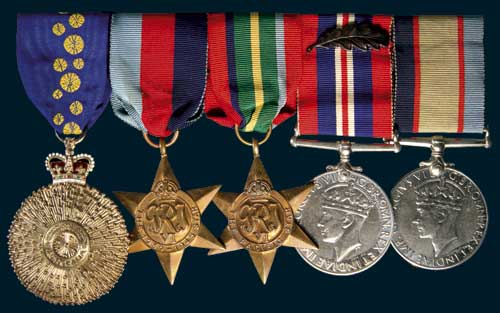Orders, Decorations & Medals - Australian Groups
Lot 5180 Session 19 (4.30pm Friday 25 November) Orders, Decorations & Medals - Australian Groups
Estimate $5,000
Bid at live.noble.com.au
SOLD $6,500
GROUP OF FIVE TO POW AND TEST CRICKETER: Member of the Order of Australia (AM); 1939-45 Star; Pacific Star; War Medal 1939-45 with MID; Australia Service Medal 1939-45. Benjamin Arthur Barnett on first medal, second and third medals unnamed, VX29818 B.A.Barnett on fourth and fifth medals. The first medal pantograph engraved, the other named medals impressed. Swing mounted very fine - extremely fine.
Together with several letter cards and envelopes to his wife written by Barnett as POW of Japanese, with Japanese markings on envelopes and censor's stamp; telegram date stamped 6 Jan 1943 advising Mrs Barnett that her husband, Capt Barnett reported missing is now a POW; another telegram date stamped 14 Sep 1945 advising her that her husband has been liberated; Japanese marked POW metal ID tag; AMF Demobilisation Procedure Book; Certificate of Service No.18442 of an Officer; various other letters.
MID: LG 6/3/1947, p1093, pos 8; CAG 6/3/1947, p760, pos 49 - for services rendered whilst POW in Japanese hands.
AM: 6/6/1977 In recognition of service to sport.
Benjamin Arthur Barnett, born 23Mar1908 at Melbourne, Vic; Enl.21Jun1940 at Caulfield, Vic; captured when Singapore fell to the Japanese in 1942 and POW in Changi and then in Thailand on the railway building; liberated in Malaya 12Sep1945; Disch.19Nov1945 as Captain ex Signals 8 Aust Div.
Benjamin Arthur Barnett was born at Auburn, Melbourne, Victoria on 23 March 1908 and was educated at Scotch College, Melbourne. He was an outstanding sportsman playing Aussie Rules for Hawthorn during the 1920s and cricket for Hawthorn/East Melbourne and Victoria during the 1920s and 1930s. He was a reserve wicket keeper to 'Bert' Oldfield for the Australian Cricket Test Team that toured England in 1934 and was selected as wicket keeper for the 1938 Australian Team. His cricketing career was interrupted by World War II. He volunteered for service rising to the rank of Captain with 8th Div Signals before he was captured when Singapore fell to the Japanese.
During his time as a POW, first in Changi and then in Thailand, he maintained records which are now held in the Signal's Museum in Wantirna, Melbourne. While a POW he organised a 'smuggling' gang that made nightly foraging excursions into Japanese held territory to get 'tucker' for his men. At Changi he said that cricket matches were played between units until the MO advised the matches should be stopped due to the prisoners' poor diet. He also said that prisoners kept up-to-date with all the latest news on cricket through the use of a secret radio in the camp and smuggled messages among the inmates.
He was in the first party that worked on the back-breaking Thailand-Burma railway and saw the party of men dwindle from 600 to fewer than 250 under the atrocious conditions that they had to work. He was lucky because he had escaped getting cholera and dysentery and had not suffered badly from malaria or beri beri, all conditions that had severely affected other POWs. On one occasion during a terrible march on the Thailand railway Captain Barnett saved a fellow-prisoner who had collapsed from exhaustion. He helped the man to his feet and then carried the man's gear as well as his own for 5-miles. One prisoner reported that Barnett had suffered many cruel beatings at the hands of the Japanese because he had 'stood up' for his men.
After he was repatriated Barnett said he was filled in on the goings-on with local cricket by his friend Don Bradman and other members of the cricket board. He was elected Captain of Hawthorn/East Melbourne but later moved his family to England where he worked for an Australian firm and also played minor counties cricket for Buckinghamshire. He represented Australia in England at both cricket and tennis and in 1969 was elected President of the International Lawn Tennis Federation, serving in this position until 1971. When he retired in 1974 he returned to Australia and in 1977 was appointed a member of the Order of Australia in recognition of his service to sport. He died in Newcastle, NSW on 29 June 1979.
Estimate / sale price does not include buyer's premium (currently 22% including GST) which is added to hammer price. All bids are executed on the understanding that the Terms & Conditions of sale have been read and accepted. For information on grading and estimates please refer to the Buying at Auction advice.
Quick find
View a lot by number and sale.
Adjacent lots
Lot 5178
PAIR: British War Medal 1914-18; Victory Medal 1914-19. 6239 Pte, M.H.Carroll. 4-Bn. A.I.F. on first ...
Estimate $180
Lot 5179
GROUP OF SIX: 1939-45 Star; Atlantic Star; Africa Star; Burma Star; War Medal 1939-45; Australia ...
Estimate $300
Lot 5180 This lot
GROUP OF FIVE TO POW AND TEST CRICKETER: Member of the Order of Australia (AM); ...
Estimate $5,000
Lot 5181
GROUP OF FIVE TO A POW WHO DIED ON SERVICE: 1939-45 Star; Pacific Star; Defence ...
Estimate $2,000
Lot 5182
FAMILY GROUP: Group of Five to KIA: 1939-45 Star; Africa Star; Defence Medal 1939-45; War ...
Estimate $1,000
